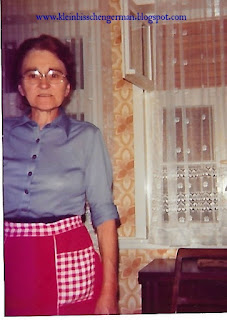This holiday season, I've been enjoying the unique German Christmas songs that are not often heard in English. Here the ones I've already blogged about:
Today I wanted to mention Ihr Kinderlein, Kommet.
This song is one I've actually heard more often in English than others (see translation at the end of the post). Here is the tune from youtube - does it sound familiar to you?!
IHR KINDERLEIN, KOMMET was written in 1789 by a priest named Christoph von Schmid. The song is an invitation for the children. Kinderlein is a form of Kinder - the -lein suffix makes the word indicate small children. Its English equivalent might be "little ones". Anytime you see -lein (or -chen) added to a word, it means small or in some cases "dear one". For example, one can do that with a name - my Oma often called me "Connylein" even though my name is Conny.
Anyway, back to our song - Ihr Kinderlein, Kommet (O Come, Little Children):
Ihr Kinderlein kommet, o kommet doch all'!
Zur Krippe her kommet in Bethlehems Stall.
Und seht, was in dieser hochheiligen Nacht
der Vater im Himmel für Freude uns macht.
O seht in der Krippe im nächtlichen Stall,
seht hier bei des Lichtleins hellglänzendem Strahl
in reinlichen Windeln das himmlische Kind,
viel schöner und holder, als Englein es sind.
Da liegt es, das Kindlein, auf Heu und auf Stroh;
Maria und Joseph betrachten es froh.
Die redlichen Hirten knien betend davor,
hoch oben schwebt jubelnd der himmlische Chor.
O beugt wie die Hirten anbetend die Knie,
erhebet die Händlein und danket wie sie.
Stimmt freudig, ihr Kinder - wer sollt' sich nicht freu'n? -
stimmt freudig zum Jubel der Engel mit ein!
Was geben wir Kinder, was schenken wir dir,
du bestes und liebstes der Kinder, dafür?
Nichts willst du von Schätzen und Reichtum der Welt,
ein Herz nur voll Demut allein dir gefällt.
"So nimm uns're Herzen zum Opfer denn hin;
wir geben sie gerne mit fröhlichem Sinn;
und mache sie heilig und selig wie deins,
und mach' sie auf ewig mit deinem in eins."
Zur Krippe her kommet in Bethlehems Stall.
Und seht, was in dieser hochheiligen Nacht
der Vater im Himmel für Freude uns macht.
O seht in der Krippe im nächtlichen Stall,
seht hier bei des Lichtleins hellglänzendem Strahl
in reinlichen Windeln das himmlische Kind,
viel schöner und holder, als Englein es sind.
Da liegt es, das Kindlein, auf Heu und auf Stroh;
Maria und Joseph betrachten es froh.
Die redlichen Hirten knien betend davor,
hoch oben schwebt jubelnd der himmlische Chor.
O beugt wie die Hirten anbetend die Knie,
erhebet die Händlein und danket wie sie.
Stimmt freudig, ihr Kinder - wer sollt' sich nicht freu'n? -
stimmt freudig zum Jubel der Engel mit ein!
Was geben wir Kinder, was schenken wir dir,
du bestes und liebstes der Kinder, dafür?
Nichts willst du von Schätzen und Reichtum der Welt,
ein Herz nur voll Demut allein dir gefällt.
"So nimm uns're Herzen zum Opfer denn hin;
wir geben sie gerne mit fröhlichem Sinn;
und mache sie heilig und selig wie deins,
und mach' sie auf ewig mit deinem in eins."
TRANSLATION (not all verse):
Oh, come, little children, oh, come, one and all,
To Bethlehem’s stable, in Bethlehem’s stall.
And see with rejoicing this glorious sight,
Our Father in heaven has sent us this night.
Oh, see in the manger, in hallowèd light
A star throws its beam on this holiest sight.
In clean swaddling clothes lies the heavenly Child,
More lovely than angels, this Baby so mild.
Oh, there lies the Christ Child, on hay and on straw;
The shepherds are kneeling before Him with awe.
And Mary and Joseph smile on Him with love,
While angels are singing sweet songs from above.
To Bethlehem’s stable, in Bethlehem’s stall.
And see with rejoicing this glorious sight,
Our Father in heaven has sent us this night.
Oh, see in the manger, in hallowèd light
A star throws its beam on this holiest sight.
In clean swaddling clothes lies the heavenly Child,
More lovely than angels, this Baby so mild.
Oh, there lies the Christ Child, on hay and on straw;
The shepherds are kneeling before Him with awe.
And Mary and Joseph smile on Him with love,
While angels are singing sweet songs from above.











































